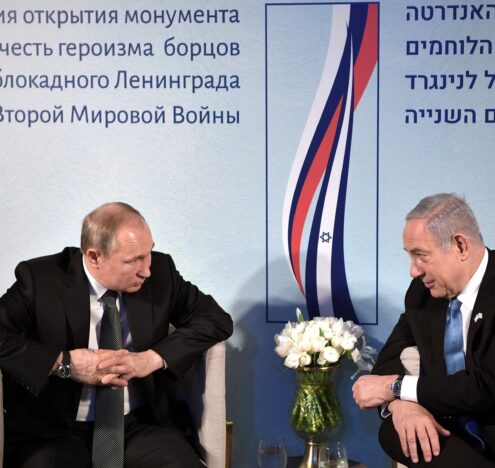US President Donald Trump’s recent trip to Saudi Arabia, Qatar, and the United Arab Emirates (UAE) produced substantial fanfare, particularly regarding shifting US priorities and approaches to its regional policy. One of the most significant areas of focus in Trump’s developing trade-first foreign policy doctrine is artificial intelligence (AI). What many have dubbed an ongoing Fourth Industrial Revolution, centralizing AI as an overarching positive for human development, the reality within the political and governance spheres is much more complicated — especially for those living in the Gulf’s brutal modern police states.
The UAE presents the most glaring example. Abu Dhabi does not hide its disdain for political liberties or open civic spaces, having worked to establish one of the world’s pre-eminent digital police states — on par with incredibly repressive countries like China and Iran. Previous administrations, including former President Joe Biden’s, recognized such risks, instituting major export controls on military and technology goods and services generally, and AI relations specifically. While some of these controls proved fleeting, especially regarding arms sales, Trump has since revoked those controls.
Those restrictions included holds on military deals with the Emiratis — most notably regarding a $23 billion F-35 sale. Biden instituted similar controls on military sales to other Gulf countries, especially in the early years of his administration. That approach included “offensive weapons” sales to Saudi Arabia, intended to end its brutal bombing campaign in Yemen. Importantly, both decisions were eventually reversed, highlighting the complicated dynamics of such controls on military and technology trade.
*
The fear in Washington that produced those restrictive trade policies is multipronged. First and foremost, Biden hoped to prevent China from obtaining US technology — part of the broader, bipartisan competition between Beijing and Washington today. Human rights concerns also factored into administration thinking, albeit understanding the fleeting nature of such efforts given Biden’s reversed approach toward the Gulf monarchies by the end of his term and his direct support for Israel during its decimation of Gaza.
That conflicted dynamic played out prominently in the AI space, where leading countries have closely guarded their AI sectors in a race to perfect the technology. As Washington has worked to garner investment partners for its global AI leadership, particularly focusing on locations for data centers, it also restricted major competitors it considers geopolitical enemies — namely, China.
Trump appears to be upending this dynamic with a risk-prone approach that discards human rights concerns and discounts the likelihood of technology falling into the wrong hands. On the latter point, Trump’s approach effectively bear-hugs the wealthy Gulf monarchies, signing off on massive deals to permanently align them with Washington.
*
As the thinking goes, US markets and defense trade are simply too valuable to pass up for these Gulf monarchies — establishing ripe ground for economic and security pacts akin to the US-Saudi Mutual Defense Assistance Agreement that traded security for oil in 1951.
To be sure, those agreements proved crucial to US interests at the time, when energy flows from the Middle East drove global economic growth. After World War II, the US lacked the oil reserves needed to power into the Cold War era with the Soviet Union. While those deals came with plenty of warts — including the Organization of the Petroleum Exporting Countries (OPEC) embargoes of the 1970s — they ultimately drove the US into its short-lived era of economic dominance after the Soviet Union’s collapse.
Abu Dhabi does not hide its disdain for political liberties or open civic spaces, having worked to establish one of the world’s pre-eminent digital police states.
While avoiding any oversimplification, the parallels between that period and today are striking. Security-driven economic factors, centered around a hyper-specific component — AI — are pushing the US and the Gulf monarchies closer together at a tumultuous period in human history. The impact of today’s decisions regarding AI could shape the future global geopolitical makeup.
And yet, this supposed perfect match comes with even more warts today. The Gulf monarchies, while relatively close partners with the US, increasingly hedge their bets on exactly these types of issues. Officials in Riyadh, Doha, and Abu Dhabi understand the true direction of global affairs — namely, the end of US primacy amid an ascendant China and the increasing influence of middle powers. Now, these middle powers deal with Beijing, signing major deals as the US has become an understandably less reliable partner in recent decades.
*
That dynamic led to Biden’s restrictions, as China invested heavily in the UAE’s port infrastructure amid accusations it sought to build naval and military bases abroad that could alter the US-induced balance of power in a crucial region. But something interesting happened when Biden began to pressure Abu Dhabi — they continued to lean into Beijing, even after work on the supposed base ended.
The UAE port saga highlights both the transactional nature of US-Gulf relations and the reality that Washington can no longer act like the world’s sole superpower. US administrations have increasingly swung wildly in competing directions concerning Washington’s security support for the region. Biden, for instance, flip-flopped on arms restrictions, and Trump refused to back Saudi Arabia after Iran’s 2019 Abqaiq attacks. In turn, the region’s leaders have adapted.
That is not to say that Washington’s relations with the region’s leaders do not matter — they do. Rather, it is to question the efficacy of a strategy that prioritizes Gulf investments as a driver of AI, especially when the investors will use AI advancement to exert greater control over their populations. Doing so undercuts US arguments claiming to cut China off from advanced technology in the AI race, as opposed to playing a great power politics game. Consistency starts with Washington understanding that it is and will remain an AI leader with or without Gulf deals that lack human rights protections.
While the Biden administration was a disaster on foreign policy generally and human rights specifically, its efforts to more stringently control AI deals and technology were wise in principle. Still, it was certainly not perfect. In an ideal world truly centralizing human rights, leaders would not partner with actors intent on using such technology to repress their people — something Biden ultimately whiffed on in the end.
*
That said, a values-based AI policy can advance US interests while understanding the world as it is, acting accordingly to avoid unnecessary headaches. If Washington wants to retain AI relations with the Gulf, it would be wise to do so on a strictly transactional level undergirded by human rights principles and a narrow focus on US interests.
That does not necessarily mean zero-sum human rights demands in deals. Rather, it means no deals that violate basic, consistent human rights standards at a minimum. Low-risk issues like urban planning and healthcare exemplify how a true balance is possible on the AI file.
Washington must understand that it can continue leading the AI space regardless of its relationship with wealthy autocracies. On this issue, AI policy should centralize principled human rights values, adopting a risk-averse approach to technology that can, will, and is used by bad actors to harm regular people. Unfortunately, the current US administration seems disinterested in the finer details of how this technology will be used in ways that are not in line with US interests or the communities living under autocratic rule.




















